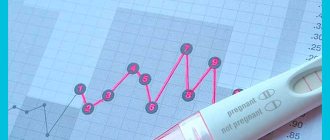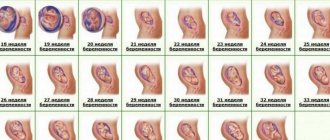What are periods
As girls reach puberty, they develop their own menstrual cycle. These are changes that occur in the genitals after approximately the same amount of time. It is divided into three main periods:
- Follicular, the period before ovulation.
- Ovulation, maturation and release of the egg from the follicle. This is the most favorable time for conception, which lasts several hours.
- Luteal, the period from the beginning of ovulation to the onset of menstruation.
During the follicular period, the endometrium, the mucous membrane covering its walls, grows on the walls of the uterus. This is the time when the female organ is preparing for fertilization and bearing a child, but if fertilization does not occur during ovulation, the endometrium peels off and leaves the body, along with mucus and blood. This cleansing process is called menstruation or, as is popularly accepted, menstruation.
Reasons for the onset of critical days
If the probability of conception is maximum, but discharge is present, then in most cases the woman has a question: can pregnancy occur with menstruation. Menstruation should alert a woman, but it does not always indicate danger. Scanty discharge that does not pose a threat may occur in the following cases:
Simultaneous maturation of two eggs in the ovaries. In this case, one of them can be fertilized, and the second comes out as a result of rejection.- Hormonal imbalance. The pregnant body is being rebuilt, and the predominance or insufficient levels of certain hormones can cause minor bleeding.
- Conception occurred at the end of the menstrual cycle.
- Error in calculating the date of conception.
- False test result.
- Implantation discharge. Damage to blood vessels or the mucous membrane during the immersion of a fertilized egg into the endometrial layer can lead to the onset of scanty periods.
- The embryo did not have time to attach to the wall of the uterus before the onset of menstruation. This leads to changes in hormonal levels, and the onset of menstruation is the body’s reaction to a forced restructuring.
Do you have periods during pregnancy?
We have already understood that every month the female body prepares for fertilization, and if it does not occur, it is intensively cleansed in order to begin preparation again. What happens if fertilization occurs? The resulting fertilized egg moves along the fallopian tube into the uterus and attaches to its wall.
Essentially, it attaches to the endometrium. Now the female body actively produces progesterone, which actively protects the endometrium and prevents it from exfoliating. Based on female physiology, we can confidently say that menstruation and pregnancy are incompatible concepts. However, in practice, there are situations when a woman has her period during this period, and now we will try to figure out why this happens.
In what cases is a doctor's examination necessary?
Pregnant women need to be constantly monitored by a gynecologist. In the early stages of pregnancy, they are required to visit a doctor once every 2 weeks. At a later date, you must come to the hospital weekly. This is necessary so that the doctor has the opportunity to fully monitor the condition and prevent possible complications.
An unusual condition, ailments and various concerns are a reason to consult a doctor outside of the schedule. It is especially dangerous when, against the background of some health problems, the mother begins to experience bleeding or pain.
Miscarriage
Spontaneous termination of pregnancy can occur at different stages. Immediate consultation with a specialist requires a condition when the discharge has a bright red tint and is accompanied by a pulling-cutting pain in the lower abdomen.
At an early stage, when pregnancy has already been diagnosed, all conditions that are accompanied by discharge and pain require examination. If the bleeding becomes intense, this indicates contraction of the uterus and complete separation of the fertilized egg.
Ectopic attachment of a fertilized egg
A dangerous condition that can lead to serious consequences is an ectopic pregnancy. Attachment of a fertilized egg outside the walls of the uterus occurs for several reasons:
- chronic diseases of the mother;
- violations of the transport function of the fallopian tubes;
- anomalies in the development and location of organs.
The development of an embryo outside the walls of the uterus threatens tissue destruction and provocation of intra-abdominal bleeding. An ectopic pregnancy requires immediate termination; medical assistance is needed as quickly as possible.
Information! In an ectopic pregnancy, the embryo cannot be saved. The operation to remove an ectopic pregnancy is called a cleanout or curettage.
Hydatidiform mole
Hydatidiform mole is a dangerous condition that occurs as a result of improper conception. A hydatidiform mole is considered the product of fertilization of an egg devoid of chromosomes. As a result, chorionic villi grow. They are hollow or fluid-filled blisters. In this case, 20% of cases of hydatidiform mole transform into a malignant tumor.
The first signs of hydatidiform mole develop with accompanying symptoms of pregnancy. Nausea and vomiting, characteristic of toxicosis, are accompanied by changes in pressure. Uterine bleeding may occur at any stage. Hydatidiform mole is diagnosed using ultrasound tracking.
Main reasons
The reasons for this phenomenon are very diverse. We need to understand when such a situation is normal, and when blood discharge may indicate that there are problems with bearing the future baby.
When periods are not normal during pregnancy
- There are situations when, during ovulation, two eggs mature at the same time, and one is fertilized. The unfertilized egg dies, and the body receives a certain signal, which provokes the appearance of menstruation. But this situation can occur during pregnancy in the first month. Subsequently, menstruation stops.
The same situation is possible if a woman has a short menstrual cycle. Ovulation in this case occurs closer to the very beginning of the cycle. Implantation of the fertilized egg into the uterus is possible just before menstruation and the body does not have time to undergo restructuring, which is why the occurrence of menstruation is observed.
- If the period of implantation of a fertilized egg into the uterine cavity is delayed (it can occur within 2 weeks), the hormonal background has not yet had time to adjust, and menstruation may begin on time. But this is possible in the first month, then it does not occur.
- There is also such a situation as late ovulation. In fact, fertilization occurs either on the eve or at the beginning of menstruation. Therefore, at first glance it seems that everything is in order.
Is it dangerous
Menstruation is an optional but normal occurrence in the first month of an interesting situation. Despite the fact that the upper layer of the endometrium peels off, this does not harm the well-attached egg and does not have any negative consequences for the unborn baby. But if menstruation continues in the future, it is necessary to urgently consult a specialist, because this is no longer a physiological process, but bleeding, which may indicate serious problems with the expectant mother or child.
Alarming symptoms
The expectant mother should be wary of any spotting in later stages, as they may indicate the following problems:
- Detachment of a fertilized egg. This is a condition that threatens miscarriage and the onset of detachment can only be determined using ultrasound. If a woman has pain in the lower abdomen and brown discharge, she should immediately consult a doctor in order to notice this process in time and then the likelihood of continuing the pregnancy is quite high.
- Ectopic pregnancy. In this situation, the fertilized egg is attached not in the uterus, but in other places, for example, in one of the tubes. And as the egg grows, the tube expands, which causes pain in one side, which increases over time. Also during this period, bleeding may occur, which also becomes more abundant over time. This is a dangerous condition for a woman, therefore, if at least one of the listed symptoms is observed, it is necessary to seek help as quickly as possible.
- Frozen pregnancy. One of the main symptoms of this condition is bleeding. When a child freezes and stops developing, the body realizes that something is going wrong and tries to get rid of this foreign body, which is why heavy bleeding occurs. The causes of freezing can be very diverse (infections, genetic predisposition, hormonal imbalances, etc.).
- Endometriosis. This is a fairly serious disease and pregnancy with such a diagnosis requires careful monitoring, otherwise spontaneous abortion may occur. It can also cause bleeding from the vagina.
As you can see, neglecting such secretions, especially in later stages during pregnancy, is extremely dangerous. Only timely contact with a specialist will help prevent serious consequences for both the mother and the future baby.
Pathologies that cause menstruation during pregnancy
Depending on what kind of menstruation occurs during pregnancy, a variety of diagnoses can be made, and they are not always insignificant. In the early stages, bleeding most often indicates detachment of the fertilized egg, and, as a result, the threat of miscarriage .
Detachment of the fertilized egg
If the detachment is small, then the body will most likely cope with the situation on its own by increasing the production of progesterone to maintain pregnancy. In this case, the discharge will be scanty, most likely spotting. There may be no other symptoms.
In more complex and dangerous cases, painful, heavy periods may occur during pregnancy. Such symptoms should be a reason to immediately consult a doctor , as well as adherence to bed rest and complete rest. Compliance or non-compliance with the last rule can be decisive in the matter of saving the pregnancy, so it should not be neglected.
Unfortunately, many women treat this recommendation condescendingly, considering light fussing around the house an analogue of bed rest: and really, how can you lie in bed if your husband comes home from work hungry in the evening? In fact, even a light jog with a broom can become a critical load in the event of a threatened miscarriage. That is why they try to hospitalize patients with this diagnosis, which ensures that women comply with bed rest.
How to distinguish periods from spotting
- Menstruation is characterized by the fact that it lasts for a certain time (from 3 to 7 days) and at the same time there is a tendency to reduce the amount of discharge.
- Small scanty and spotting discharge is not menstruation, but a small discharge of blood, which means this indicates a problem.
- Compared to menstruation, bleeding lasts more than 7 days and the amount of blood increases every day.
- When bleeding, a woman loses a sufficient amount of blood, which can lead to anemia, so this phenomenon is accompanied by poor health, dizziness, fainting and even nausea.
Is it possible to distinguish the washing of the fetus from normal menstruation?
So, let's figure out whether menstruation can still occur in the first month of pregnancy, and also how to distinguish such discharge? You can find a comparative analysis in the table.
| Signs | After fertilization | Normal monthly bleeding |
| Dates of onset | Often delayed or, conversely, ahead of schedule | On time |
| Volume of allocated secret | The discharge is barely noticeable, scanty in nature and pale in color. | Normal |
| Hue | Pale or, conversely, brown. Scarlet blood may indicate an incipient miscarriage | Regular |
| Duration | Often last 1-2 days. Sometimes there is prolonged spotting | As usual, from 5 to 7 days |
| Associated symptoms | If we are talking about an incipient miscarriage, the woman often experiences nagging or cramping pain | The condition is no different from normal menstruation |
Heavy menstruation
If we talk about pregnancy for a period of 1 month, then menstruation can be observed, and they can be either heavy or not very heavy. The main thing is that the woman feels quite normal and can carry out her usual activities.
But if heavy menstruation continues in the future, this is a serious cause for concern, since this can harm both the expectant mother and the unborn child. Therefore, it is very important to provide timely assistance to prevent potential fetal death and health problems for the expectant mother.
How is pregnancy determined during menstruation?
It is very easy to recognize pregnancy in the presence of critical days, but only for those women who know their body well, listen to its signals and keep a schedule of critical days. For young girls who have little idea what is happening, this is difficult.
Signs
The main signs of the onset of menstruation during pregnancy are the accompanying symptoms:
- breast tenderness on palpation;
- change in psychological state: sudden mood swings;
- pulling sensations in the lower abdomen that resemble sensations during menstruation;
- the presence of a headache that goes away on its own;
- slight increase in temperature, slight chills in the morning are possible.
We are talking about a complex of symptoms that, in combination with each other, make up a single clinical picture.
Existing methods and tests
To determine conception in the early stages, various tests are performed:
- Measuring basal temperature. With changes in the functioning of the reproductive system, the basal temperature rises to 37.2-37.4 degrees. Changes can be detected by measuring basal temperature for 1 month. Basal temperature is measured in the morning, after waking up, by inserting a thermometer into the rectum. If the graph shows an unexpected jump upward, then this can be considered confirmation of pregnancy.
- Presence of hCG. To determine the indicator, blood is donated using a laboratory method. This hormone is produced only after embryo implantation. The analysis becomes reliable 6-8 days after fertilization. During pregnancy, the level of hCG is an indicator of the successful course of the condition.
- Test using urine. This test is done at home. Various home test options involve dipping a strip into a container of collected urine. They are labeled with antibodies to hCG. After contact with the test material, the result is shown. The disadvantage of the tests is that they give false positive and false negative results. Cheap tests show 2 strips, more expensive analogues are able to show the approximate gestational age on a digital display.
Attention! For the home test, morning urine is collected.
First aid
- Before providing first aid, it is necessary to find the cause of the bleeding. As a rule, an emergency ultrasound or gynecological examination is performed, with the help of which the condition of the placenta, baby and internal organs is determined. In the future, the doctor prescribes medications that can normalize hormonal levels and maintain pregnancy.
- Also, if necessary, various tests can be performed.
- If the baby's death is imminent and rejection has already begun, doctors perform additional procedures to remove debris from the uterus, which could cause serious inflammation if left in the uterus.
If bleeding continues
The reason for the continuation of discharge during pregnancy may be the unstable hormonal background of a woman, which is not uncommon in our time. It happens that during pregnancy there is a decrease in estrogen levels, and then spotting is quite possible exactly at the time when your period should be. If spotting appears only when moving, disappears at night and is never accompanied by pain, this is more likely a hormonal disorder in the body and consulting a doctor would not hurt.
If you suddenly experience bleeding, accompanied by acute or nagging pain in the lower abdomen or dull pain in the lower back, you should immediately consult your doctor or call an ambulance.
The causes of such bleeding may be:
- inflammation of the cervix, growths on it
- placenta previa
- detachment of the patient
- ectopic pregnancy
- the beginning of a miscarriage
Bleeding in itself is not dangerous to the fetus, but it does affect the pregnancy process. Therefore, if the slightest bleeding appears, you should immediately seek medical help.
Helpful information
Every woman who plans to become a mother is interested in the question of how to prepare for pregnancy, and this is really very important, because not only the process of pregnancy, but also the correct intrauterine development of the child will largely depend on the preparation. Some, faced with unsuccessful attempts, wonder: why can’t they get pregnant? These articles will help you find answers to your questions.
Expectant mothers are also interested in information about how many weeks the baby begins to move, because this is one of the indicators that the baby is comfortable in the tummy or, conversely, that there are certain difficulties. Well, if you have varicose veins while carrying your baby, this information will help you decide on further actions that will help get rid of this disease.
What could you say about this topic? Perhaps you also had periods during pregnancy? We will be glad if you share your stories and possible tips in the comments.
Ectopic pregnancy
If there is menstrual-like discharge during pregnancy, a woman should take the necessary measures. To avoid a threat to the health and life of yourself and your child, you should immediately seek medical help.
Important! The danger is that a woman who discovers that she is supposedly “menstruating” does not suspect that she is pregnant.
Bleeding during an ectopic pregnancy can be very heavy, leading to serious blood loss.
Ectopic pregnancy
How to use the test
During menstruation, the test can show the same as in their absence. In order to get a real result, follow the rules of its implementation:
- Drink less fluid the day before, especially in the evening, to increase the concentration of morning urine. This is especially important in the very early stages;
- before the first morning urination, wash yourself thoroughly and insert a tampon into the vagina;
- collect the first portion of urine into a sterile container;
- make sure that the test has not expired and is packaged intact;
- lower the test strip only to the level specified in the instructions, not deeper;
- observe the time for assessing the result.
As a rule, a pregnancy test during menstruation is negative. Often, premenstrual syndrome in its symptoms is similar to the first signs of conception. And a woman is mistaken when she mistakes PMS for pregnancy.
Rarely, but another option is possible: conception did occur. But on the first day of menstruation, the test has not yet shown it, because the period is too short. You can repeat the test a little later, which can show pregnancy after menstruation, since as the period increases, the concentration of hCG in the urine increases. But, we repeat, then this is no longer menstruation, but a completely different bleeding (more on this below).
A positive test result is the best answer to the question of how to distinguish menstruation from pregnancy for those who dream of a baby.
Since the test can be erroneous, especially if done on the first day of your period, you can donate blood to test for the presence of hCG. This analysis is able to determine conception - already in the first month of pregnancy, approximately 10-15 days after fertilization.
Reasons for menstruation at different times
It is sometimes quite difficult to distinguish between periods and spotting during pregnancy on your own, especially in the early stages. More often, questions and errors arise in women with irregular, long or short cycles.
In the classical view, conception is possible only on days 13–15 with a 28-day cycle. But in reality, the ovulation process is influenced by many factors: stress, the woman’s recent emotional state, regularity of sexual activity, body weight and its fluctuations, acute viral diseases, taking medications. The list is very large, and sometimes it is difficult to predict the actions of your own body. Therefore, the release of an egg from the ovary often occurs at the beginning, end, or even several times in one month. It is in such situations that a woman may be confused and try to independently distinguish the onset of menstruation from pregnancy.
Late ovulation
When the release of the egg shifts towards the end of the cycle, on days 21-25 after fertilization, it does not have time to implant into the mucous membrane of the uterine cavity. But hormonal changes are already beginning to occur in a woman’s body. Under the influence of these events, the endometrium is still rejected.
Early ovulation
Having open sex during the last days of menstruation can also ultimately result in conception. In this case, the discharge may continue longer than usual, and the woman mistakes it for normal critical days.
Multiple ovulation
Sometimes, especially when oral contraceptives are discontinued, several eggs are released from the ovary at once, simultaneously or with some interval. One option is repeated ovulation at the end of the cycle, at the beginning of menstruation. Then, with open sexual intercourse, the likelihood of pregnancy is high. But critical days will also perhaps be a little unusual.
We recommend reading the article about spotting during ovulation. From it you will learn about the physiology of the female body, the reasons for the appearance of discharge, and whether you need to see a gynecologist.
Anomaly of development of female genital organs
It is not so rare to find such deviations in the standard structure of the pelvic organs as a double uterus and a bicornuate uterus, a septum in the cavity - complete or incomplete. With this development, the organ behaves a little differently than in the classical sense. The fertilized egg is implanted in one part, such as the right or left horn. At this time, menstrual-like changes occur in another, the endometrium is rejected, but only in this area. This can go on for several months, and the woman will not even suspect that she is pregnant. It is difficult to distinguish the signs of conception from the signs of menstruation in such a situation: after all, the embryo develops in one place, and the usual cyclic changes in the endometrium occur nearby.
Is it possible to find out the gestational age by menstruation?
To determine the exact date of conception, doctors most often use the method of counting from menstruation. As you know, the greatest chance of conception is in the middle of the menstrual cycle, approximately 10-17 days. Is it possible to find out the gestational age by menstruation? Of course you can.
For this purpose, experts use several methods. The simplest is to do a special pregnancy test, which can be performed 7 days after the delay is detected.
But what to do if there is no delay, and your periods started as usual? The most accurate method for determining the duration of a suspected pregnancy is an hCG test, which can be taken in any laboratory.
It has been established that already a week after conception, the female body begins to produce a specific substance - human chorionic gonadotropin. An increase in the level of this hormone is the main sign of pregnancy.
But it is important to remember that self-administered pregnancy tests may show a false negative result. This means that the test gives a negative result if hCG is present in the body. It is best to trust everything to laboratory tests.
Causes of blood loss
In the first days, when the woman is not yet aware of it, some blood discharge from the vagina may be observed, which is similar to menstruation before the delay. The symptoms and sensations of bleeding will be little different from menstruation.
To understand the difference, you need to understand the reasons:
- ectopic pregnancy, a pathological process in which the fertilized egg attaches outside the uterus, which causes significant blood loss and complications, including surgery and removal of the reproductive organs;
- infectious processes of the genital organs cause blood to appear, and the smear will differ significantly from the usual;
- insufficient production of hormones can lead to miscarriage, when the embryo is rejected and bleeding begins;
- congenital malformations of the uterus (bicornus, duplication);
- injured cervix;
- the death of the embryo inside the womb causes increased blood loss, which will require qualified medical care.
You can distinguish the onset of menstruation from pregnancy by the number and additional symptoms. In the first months of gestation, the main reason for the appearance of blood is hormonal imbalances or conception on the days of menstruation. At later stages, the differences become more pronounced, especially with ectopic pregnancy, when symptoms are accompanied by a significant deterioration in well-being.










